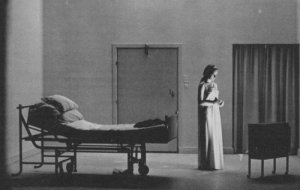
Essay: A Way to Relive Nightmares
Notes on Ingmar's Bergman's "Persona"

|
| Watching television is a way to relive nightmares |
It's been a while since I've seen Persona, a good 12 years. I did a presentation on the film for a university, and I studied it to death, as it deserves to be. I won't bore you with critical comments here, only to mention two moments that stay with me:
the patient left in the room after the nurse has left her. The patient is lying in bed, with the shadows taking over her face and the melodies of Bach permeating the room. Gradually her face is consumed with darkness, and there is the sound of sobs. She is lost in her consoling world of art, selfish person that she is. It is a hopeless almost self-imposed isolation, and yet it is also her saving grace, her simple willingness to be swept away by the melodies and darkness. And it is also the moments of her darkness and despair, moments of suffering and raw emotion in a very quiet movie, moments normally hidden from us except in the artificial world of cinema.
The other scene: she is staring transfixed at the tv images of war and buddhist monks immolating themselves in vietnam. The TV announcer droned on in English with meaningless talk about politics and wars and armies while the image flickered on. (I write this only two weeks after the endless images of the World Trade Center bombing, alternating between feelings of intense emotional connection and utter revulsion about how tv broadcasts manage to trivialize any tragedy.) And of course, the Buddhist monks are suffering but are following their dharma and detaching themselves from emotional attachments in the world.
An actress needs to imitate and emphasize, but this actress somehow has stopped up her ability to do so. She wills to lose that human connection, that empathy, that is the source of so much suffering. Yet, even when she withdraws, she is again drawn into so many things, the nurse's stories, Bach, the monks. Just as the actress's willpower about not talking is ultimately worn down by the nurse, I think Bergman believes that this detachment (which is so vital to the artistic experience) cannot be sustained unceasingly. A person falls back into the world of taking out the garbage, telephoning one's family members, going to work, and going to the grocery store to keep from starving. .
I think the film calls attention to the allure of both worlds and the impossibility of pursuing one at the expense of the other.